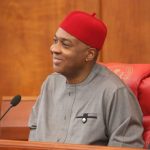The United Nations Children’s Fund (UNICEF) on Tuesday, called on the Federal Government to provide intensive support for the 21 released Chibok girls to safeguard their future.
The group made the call in a statement signed by Mr Gianfranco Rotigliano, its Country Representative and made available to newsmen in Maiduguri.
“The release is great news and we are delighted to see the girls back with their families.
“But we must keep pressing for all the women and children held by Boko Haram to be freed.
“And we must bear in mind that all of those who have been held by Boko Haram will face a long and difficult process to rebuild their lives after the indescribable trauma they have suffered,” Rotigliano said.
He also said that the more than 200 Chibok girls abducted by Boko Haram in April 2014 were among thousands of women and girls that UNICEF estimated had been held and subjected to violence by the group.
“UNICEF has supported hundreds of women and girls who have already been released or escaped from Boko Haram.
“The girls’ report that they have been subjected to rape – frequently in the form of forced marriages – beatings, intimidation and starvation during their captivity. Many returned pregnant or with babies as a result of rape.
“When they do reach safety, girls who have been held by Boko Haram are often ill, malnourished, traumatised and exhausted.
“They are in need of medical attention and psychosocial support so that they can begin to come to terms with their experiences and reintegrate with their families and communities.
“Frequently, returning to their families and communities is the beginning of a new ordeal for the girls, as the sexual violence they have suffered often results in stigmatisation.
“People are also often afraid that the girls have been indoctrinated by Boko Haram and that they pose a threat to their communities.”
“The use by Boko Haram of children – mostly girls – as so called ‘suicide bombers’ has fueled such fears.
“Children born as a result of the sexual violence are at even greater risk of rejection, abandonment and violence.
“Since January, UNICEF and its partner International Alert have been providing psychosocial support for women and girls who have experienced sexual violence in the hands of Boko Haram.
“UNICEF and International Alert are also working with affected communities through a network of trained religious and community leaders to promote acceptance and to address negative perceptions that hamper the reintegration of women and girls who have suffered such violence.
“Funding from the Swedish International Development Agency and the UK Department for International Development has so far this year enabled UNICEF to provide a comprehensive programme of reintegration assistance to more than 750 women and girls subjected to Boko Haram-related sexual violence.
“With such large numbers of women and girls having been held by the group, however, the long-term provision of much-needed support remains heavily underfunded,’’ the UNICEF official said.
… Wants Nigeria to end abuse of child right
The United Nations Children’s Emergency Fund (UNICEF) on Tuesday advised Nigeria to end the increasing rate of abuse and violence against children.
Professor Pai Obanya, a resource person at an advocacy meeting, tagged “Scaling up on mass communication training institutions, mainstreaming child rights report curriculum in Nigeria,” gave the advice in Ibadan.
The News Agency of Nigeria (NAN) reports that the advocacy meeting was organised by Lagos State Ministry of Information and Strategy in collaboration with UNICEF.
Obanya, a Professor Emeritus and the developer of Universal Basic Education (UBE), faulted government posture on the implementation of the Child Rights Act, describing it as mere cosmetics.
He attributed non-compliance on policies bordering on child rights to poor child-sensitive budgeting of government at all levels.
“It doesn’t pay to just say you have a policy on something without specifically putting resources aside for it.
“It relates to taking into account what the declaration says about right to life, protection, health nutrition and self-actualisation.
“Nigeria has a problem of, first of all, not ratifying enough and when it ratifies, it doesn’t really sensitise the populace to know what it is all about.
“And on the part of government, we have not fully implemented the international agreement we entered into on the child’s right,” he said.
Obanla lamented that a child who had not got a chance of equal access to quality education was not likely to have equal access to quality living in later life.
He said that Nigeria and many other African nations, except those in Southern Africa, South Africa itself, Mozambique, Botswana, Lesotho and Swaziland, placed premium on child’s right.
According to the UNICEF Communication Officer, Mrs Blessing Ejiofor, the one-day event was designed to get more teachers and media practitioners involved in the promotion and protection of the child’s rights.
Ejiofor said that as a matter of profession, the inclusion of the child rights reportage into Mass Communication training institutions and mainstreaming it in their curriculum will help end abuse and violence against children.
Mr Geoffrey Njoku, the UNICEF Communication Specialist, who spoke on the history of child rights reporting in Nigeria, noted that the training would lead to more communication training institutions teaching child rights reporting.
“Students that benefited from rights reporting training will be well equipped and promoting child rights as practising professionals.
“More students of mass communication writing their projects (thesis) on aspects of child rights,” he said.





